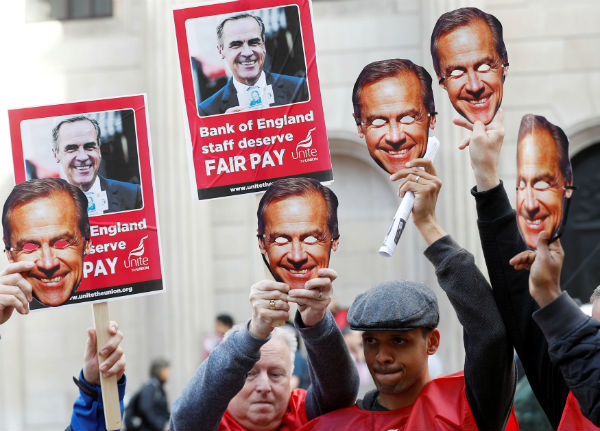Union decries 'derisory' settlement imposed upon workers

LONDON (Reuters) — Staff at the Bank of England began their first strike in more than 50 years on Tuesday in a push for higher pay, highlighting growing pressure to end tight controls on public sector wages in Britain.
The three-day strike will overlap with an interest rate decision on Thursday and involves maintenance and security staff at the 323-year-old Bank.
About 15 staff members, some wearing face masks of Governor Mark Carney, staged a picket outside the BoE's central London headquarters on Tuesday. About 150 people work in the departments affected by the stoppage.
The employees, who are part of the Unite trade union, said they were protesting the "derisory" pay settlement that the bank had imposed on staff without the union's agreement.
John McDonnell, the main opposition Labour Party's top economic official, attended the protest and called for the BoE to set an example to employers by raising their wages.
Unite said that many of those who were balloted about the strike action earned less than 20,000 pounds (US$26,400) a year.
Prime Minister Theresa May has come under increasing pressure from lawmakers to end a below-inflation one per cent cap on public sector pay rises that has been in place since 2013 as part of efforts to cut government spending.
Although it is operationally independent of the government, the BoE has also limited pay rises to one per cent for most staff, in line with other public bodies.
The BoE said Unite had balloted around two per cent of the BoE's 3,600-strong workforce and that it had plans in place to operate effectively.
"The Bank has been in talks with Unite up to and including today and remains ready to continue those talks at any time," a Bank spokesperson said in a statement.
Unite said if the BoE fails to resolve the pay dispute, it would consult its members at the Bank in departments other than just maintenance and security on further action.




